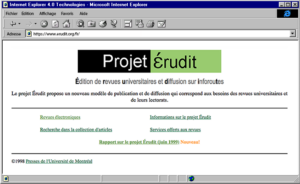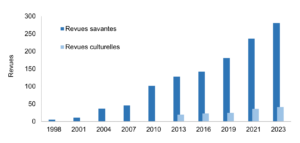
Summary: The reach of research and the discoverability of scholarly publications in a constantly evolving technological environment depend on the establishment of strong partnerships, rigorous standards and a process of continuous innovation. This is the work that the Érudit Consortium has been doing since 1998, to help raise the international notoriety of Canadian scholarly journals in the humanities and social sciences, particularly in the French-speaking world.
As we look into the creation of Érudit, we get a glimpse of the recent history of scholarly journals, as it touches on issues like technological evolution, ownership by research communities, national and international scientific collaboration, and efforts made to preserve bibliodiversity. What was a pilot project in 1998 has become the main infrastructure for disseminating scholarly articles in the fields of the social sciences and the humanities in Canada, especially in French. Today, Érudit is an inter-university and multidisciplinary institution, offering local support to scholarly journals and a world-class technology platform.
I.From Pilot Project to Flagship Project
The foundations of Érudit were laid in 1996 by the Presses de l’Université de Montréal (PUM), when it created the Direction des publications électroniques, whose primary objective was to support the scholarly journals published by the PUM as they transitioned to digital publishing. It became self-evident that raw text could not be simply dumped unto a web page. For articles to display correctly, and to make them more discoverable by search engines, the content and metadata of each must undergo more sophisticated digital editing processing. With this strategy, the first erudit.org platform came online in 1998, offering visibility and accessibility to five scholarly journals.
The Erudit website in 1998

At the turn of the millennium, several exchanges between the leadership team at Érudit, editorial teams and researchers highlighted the need for professional digital editing services in Québec. With a will to promote inter-institutional collaboration, two digital production centres were created, one at the Université de Montréal and one at Université Laval. The teams at these universities established a digital processing chain for articles, a solid protocol that provided technical staff with a high level of automation. In 2004, the Érudit Consortium was legally founded as a general partnership, made up of the Université de Montréal, the Université Laval and the Université du Québec à Montréal. In parallel, the number of journals disseminated on the platform had never stopped growing, reaching around forty at that moment.
Starting in 2008, the platform added several new features: a multilingual browsing interface, a research tool, an index per author for each journal collection, a tool for saving bibliographic records, and an indexing system for searching and browsing the content of partner platforms. This expansion was made possible by the financial support provided by the Ministère du Développement économique, de l’Innovation et de l’Exportation du Québec and the Fonds de recherche du Québec – Société et Culture (FRQSC). It is also in the early 2010s that ties were established with the rest of the Canadian provinces and some European countries. In 2014, the Érudit Consortium became the first infrastructure in the fields of the social sciences and the humanities to be given the status of Major Scientific Initiative (MSI) by the Canada Foundation for Innovation (CFI).
Number of journals disseminated on the Erudit platform, 1998-2023

In 2017, the Érudit Consortium joined forces with the Public Knowledge Project (PKP) to create Coalition Publica. The infrastructure produced by this partnership leveraged the complementarity of two flagship technologies for open access and open science: the Open Journal Systems (OJS) software for editing and publishing from PKP and the erudit.org dissemination platform. By joining forces, these two institutions optimized their digital dissemination processes and enhanced the services offered to Canadian journals. Starting in 2017, Coalition Publica received funding from the CFI, followed by funding from the Social Sciences and Humanities Research Council in 2020. The FRQSC, Érudit’s long-term partner, still provides key support to help maintain and expand the Consortium’s activities.
In 2023, Érudit reached the threshold of 150,000 scholarly articles on the platform, published in 279 journals, on top of 41 cultural journals containing 90,000 articles. With a team of around forty employees attached to the Université de Montréal, the institution is now solidly established, helping journals meet their needs, which have continued to grow with the development of open access policies.
II. A Standard-Bearer for Bibliodiversity
Canadian journals in the social sciences and the humanities are characterized by their lack of a profit motive and their rooting in the academic world. They are the preferred space for publishing research projects on local issues and represent the key vectors for the vitality of French-language research within Canadian institutions. Despite this, on a global scale, scholarly publishing is dominated by a small number of multinational companies, and English is the lingua franca. Today, the vast majority of journals published by these publishers are in English, and are generally highly regarded by the research community. Trapped·in a “publish or perish” dynamic, researchers feel the pressure to publish in these high impact journals. The use of journals associated with for-profit publishers then in turn amplifies the presence of English in scientific literature. Moreover, this dynamic creates leverage that publishers can use to disproportionally increase subscription fees: since the 1980s, the costs for libraries have increased on average by 10% a year, while their budgets have stagnated for several years. This growing stranglehold on library budgets comes at the expense of content published in languages other than English.
Platforms such as Érudit, CAIRN (in France) and SciELO (in Brazil) break with this restrictive approach by promoting a diversity of publications, in other words, bibliodiversity. Bibliodiversity refers to a publishing ecosystem that is balanced, resilient and plurilingual and in which a multitude of publishing models coexist, deployed by different publishing stakeholders.
III. Open Access and The Common Good
Scholarly publishing is a key element of the academic research cycle, mostly publicly funded. This research, and the knowledge that comes from it, must remain a public good, available to both research teams and the wider public. The movement for open access, initiated in 2002 by the publication of the Budapest Open Access Initiative, aims to thoroughly transform research on a global scale, and is part of the struggle by research communities to regain control of scholarly publishing. For their part, the large commercial publishers have developed a set of practices that lets them take advantage of the principles of open access, such as charging publishing fees (Article Processing Charges or APCs). The publishing fee model requires that authors pay to get their articles published. Instead of subscription fees, which act as a barrier to reading, we get a barrier to publishing.
Today, more than half of the journals disseminated on Érudit are in open access, while a one-year rolling access restriction postpones access to current issues for the other half of the journals in the collection, which continue to sell their issues through a subscription model. Thanks to this flexible model, which allows editorial teams to choose the formula that best suits their funding methods and philosophy, 98% of the articles published on the platform are available in open access today. The journals on the Érudit platform do not charge fees to authors, something referred to as “diamond open access.”
In collaboration with stakeholders, university libraries, funding agencies (including the CFI, the SSHRC and the FRQSC) and the journals themselves, Érudit plays an active role in promoting more open, equitable and inclusive scholarly publishing in the French-speaking world, both nationally and internationally.
Bibliography
- Beaudry, G., Boucher, M., Niemann, T. & Boismenu, G. (2009). “Érudit : le numérique au service de l’édition en sciences humaines et sociales”. Mémoires du livre / Studies in Book Culture. https://doi.org/10.7202/038637ar
- Larivière, V. (2018). “Le français, langue seconde ? De l’évolution des lieux et langues de publication des chercheurs au Québec, en France et en Allemagne”. Recherches sociographiques, 59(3), 339–363. https://doi.org/10.7202/1058718ar
- Shu, F., Mongeon, P., Haustein, S., Siler, K., Alperin, J. & Larivière, V. (2018). “Is It Such a Big Deal? On the Cost of Journal Use in the Digital Era”. College & Research Libraries, 79(6), 785. https://doi.org/10.5860/crl.79.6.785
Authors:
- Gwendal Henry, Communications Consultant, Érudit Consortium – gwendal.henry@erudit.org
- Simon van Bellen, Senior Consultant – Research, Érudit Consortium – simon.van.bellen@erudit.org
- Tanja Niemann, Executive Director, Érudit Consortium – tanja.niemann@erudit.org